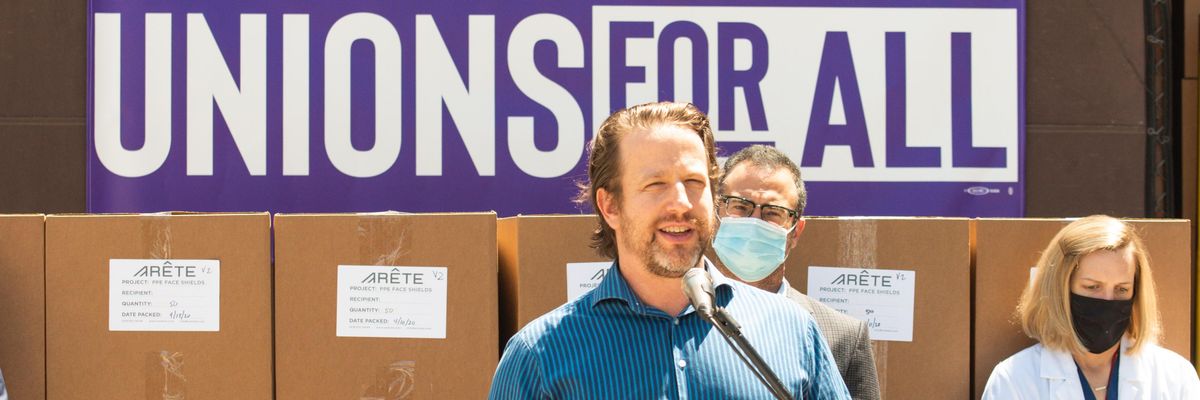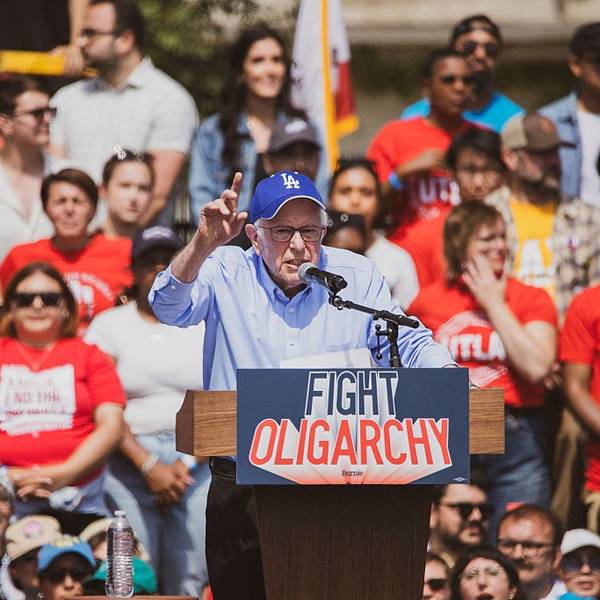
Joe Sanberg speaks at a press conference on April 14, 2020 in Los Angeles, California. (Photo: Presley Ann/Getty Images for Emergency Supply Donor Group)
Signature Gathering Begins for $18 Minimum Wage Fight in California
"Raising the minimum wage in the Golden State is a moral imperative," said Joe Sanberg, the investor and anti-poverty activist sponsoring the ballot initiative.
The signature-gathering process for an initiative to raise the California minimum wage to $18 an hour by 2025 officially began Wednesday, the latest step toward getting the proposal on the state ballot in November.
"There is not one California worker who is making a good living on $15 an hour. Not one."
The current minimum wage in California is $15 per hour for businesses with 26 or more employees. While that's more than double the federal wage floor of $7.25, campaigners say it's still far from enough in a state with one of the highest costs of living in the U.S.
According to the Massachusetts Institute of Technology's Living Wage Calculator, a single parent of two kids would need to make $50 an hour to fully cover essential expenses in California.
"There is not one California worker who is making a good living on $15 an hour. Not one," Joe Sanberg, the investor and progressive anti-poverty activist sponsoring the proposed ballot measure, said in a statement Wednesday. "Many of the heroic essential workers--who have put their lives on the line to go to work during the pandemic--are paid wages so low they can't afford to pay for even their most basic needs."
"And because of the systemic inequity that governs this country, workers of color are much more likely to be paid poverty-level wages," Sanberg added. "That has to change. Raising the minimum wage in the Golden State is a moral imperative."
Titled the Living Wage Act of 2022, the measure would require businesses with 26 or more employees to raise their base pay by a dollar each year until it hits $18 an hour by January 1, 2025. Smaller businesses would be given an additional year to reach the $18-an-hour level.
Thereafter, California's minimum wage would be adjusted for inflation.
For their proposal to make it onto California voters' ballots in November, the campaign for the Living Wage Act must collect at least 623,212 valid signatures in the coming months ahead of an early-summer deadline.
Art Pulaski, executive secretary-treasurer of the California Labor Federation, said Wednesday that "raising the minimum wage is one of the strongest anti-poverty measures we have as a state."
"For low-wage workers, a higher minimum wage is life-changing," Pulaski added. "Better wages for workers also means they have more to spend at local businesses in our communities. If we're serious about combating poverty and reducing inequality, raising the minimum wage is an absolute necessity."
An Urgent Message From Our Co-Founder
Dear Common Dreams reader, The U.S. is on a fast track to authoritarianism like nothing I've ever seen. Meanwhile, corporate news outlets are utterly capitulating to Trump, twisting their coverage to avoid drawing his ire while lining up to stuff cash in his pockets. That's why I believe that Common Dreams is doing the best and most consequential reporting that we've ever done. Our small but mighty team is a progressive reporting powerhouse, covering the news every day that the corporate media never will. Our mission has always been simple: To inform. To inspire. And to ignite change for the common good. Now here's the key piece that I want all our readers to understand: None of this would be possible without your financial support. That's not just some fundraising cliche. It's the absolute and literal truth. We don't accept corporate advertising and never will. We don't have a paywall because we don't think people should be blocked from critical news based on their ability to pay. Everything we do is funded by the donations of readers like you. Will you donate now to help power the nonprofit, independent reporting of Common Dreams? Thank you for being a vital member of our community. Together, we can keep independent journalism alive when it’s needed most. - Craig Brown, Co-founder |
The signature-gathering process for an initiative to raise the California minimum wage to $18 an hour by 2025 officially began Wednesday, the latest step toward getting the proposal on the state ballot in November.
"There is not one California worker who is making a good living on $15 an hour. Not one."
The current minimum wage in California is $15 per hour for businesses with 26 or more employees. While that's more than double the federal wage floor of $7.25, campaigners say it's still far from enough in a state with one of the highest costs of living in the U.S.
According to the Massachusetts Institute of Technology's Living Wage Calculator, a single parent of two kids would need to make $50 an hour to fully cover essential expenses in California.
"There is not one California worker who is making a good living on $15 an hour. Not one," Joe Sanberg, the investor and progressive anti-poverty activist sponsoring the proposed ballot measure, said in a statement Wednesday. "Many of the heroic essential workers--who have put their lives on the line to go to work during the pandemic--are paid wages so low they can't afford to pay for even their most basic needs."
"And because of the systemic inequity that governs this country, workers of color are much more likely to be paid poverty-level wages," Sanberg added. "That has to change. Raising the minimum wage in the Golden State is a moral imperative."
Titled the Living Wage Act of 2022, the measure would require businesses with 26 or more employees to raise their base pay by a dollar each year until it hits $18 an hour by January 1, 2025. Smaller businesses would be given an additional year to reach the $18-an-hour level.
Thereafter, California's minimum wage would be adjusted for inflation.
For their proposal to make it onto California voters' ballots in November, the campaign for the Living Wage Act must collect at least 623,212 valid signatures in the coming months ahead of an early-summer deadline.
Art Pulaski, executive secretary-treasurer of the California Labor Federation, said Wednesday that "raising the minimum wage is one of the strongest anti-poverty measures we have as a state."
"For low-wage workers, a higher minimum wage is life-changing," Pulaski added. "Better wages for workers also means they have more to spend at local businesses in our communities. If we're serious about combating poverty and reducing inequality, raising the minimum wage is an absolute necessity."
The signature-gathering process for an initiative to raise the California minimum wage to $18 an hour by 2025 officially began Wednesday, the latest step toward getting the proposal on the state ballot in November.
"There is not one California worker who is making a good living on $15 an hour. Not one."
The current minimum wage in California is $15 per hour for businesses with 26 or more employees. While that's more than double the federal wage floor of $7.25, campaigners say it's still far from enough in a state with one of the highest costs of living in the U.S.
According to the Massachusetts Institute of Technology's Living Wage Calculator, a single parent of two kids would need to make $50 an hour to fully cover essential expenses in California.
"There is not one California worker who is making a good living on $15 an hour. Not one," Joe Sanberg, the investor and progressive anti-poverty activist sponsoring the proposed ballot measure, said in a statement Wednesday. "Many of the heroic essential workers--who have put their lives on the line to go to work during the pandemic--are paid wages so low they can't afford to pay for even their most basic needs."
"And because of the systemic inequity that governs this country, workers of color are much more likely to be paid poverty-level wages," Sanberg added. "That has to change. Raising the minimum wage in the Golden State is a moral imperative."
Titled the Living Wage Act of 2022, the measure would require businesses with 26 or more employees to raise their base pay by a dollar each year until it hits $18 an hour by January 1, 2025. Smaller businesses would be given an additional year to reach the $18-an-hour level.
Thereafter, California's minimum wage would be adjusted for inflation.
For their proposal to make it onto California voters' ballots in November, the campaign for the Living Wage Act must collect at least 623,212 valid signatures in the coming months ahead of an early-summer deadline.
Art Pulaski, executive secretary-treasurer of the California Labor Federation, said Wednesday that "raising the minimum wage is one of the strongest anti-poverty measures we have as a state."
"For low-wage workers, a higher minimum wage is life-changing," Pulaski added. "Better wages for workers also means they have more to spend at local businesses in our communities. If we're serious about combating poverty and reducing inequality, raising the minimum wage is an absolute necessity."

